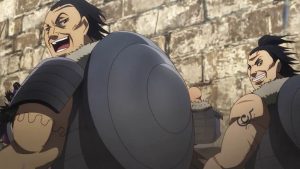 While it makes for great TV, I confess I find the situational moralism of military adventure yarns like Kingdom quite absurd a lot of the time.War is hell, period – I won’t say there aren’t times when it’s unavoidable, but it’s never desirable. And death in death, no matter how it comes. I don’t think it’s unrealistic to depict these warring states generals as believing otherwise though – or a lot more recent military types besides. And as these sorts of tales go, the last days of Zhang Tang was one of the better you’ll see in anime.
While it makes for great TV, I confess I find the situational moralism of military adventure yarns like Kingdom quite absurd a lot of the time.War is hell, period – I won’t say there aren’t times when it’s unavoidable, but it’s never desirable. And death in death, no matter how it comes. I don’t think it’s unrealistic to depict these warring states generals as believing otherwise though – or a lot more recent military types besides. And as these sorts of tales go, the last days of Zhang Tang was one of the better you’ll see in anime.
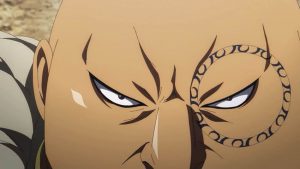 Huan Yi in practical terms is the key figure here. He’s the one who devises the plan which sets everything in motion. That plan? Descend to the battlefield with a small force of 400 men disguised as a Wei unit, and claim the head of the Han general Cheng Hui. It’s a desperately risky move, but the brilliant Huan Yi knows that the defense of Hangu Pass is hanging by a thread. The momentum is with the attackers (along with the numbers, and time) and conservative tactics simply aren’t going to move the needle.
Huan Yi in practical terms is the key figure here. He’s the one who devises the plan which sets everything in motion. That plan? Descend to the battlefield with a small force of 400 men disguised as a Wei unit, and claim the head of the Han general Cheng Hui. It’s a desperately risky move, but the brilliant Huan Yi knows that the defense of Hangu Pass is hanging by a thread. The momentum is with the attackers (along with the numbers, and time) and conservative tactics simply aren’t going to move the needle.
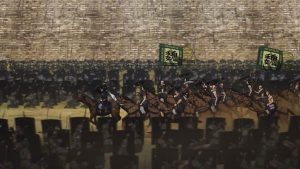 Cheng Hui is, of course, the general who poisoned Zhang Tang, who’s been playing out the act of dying over the past two episodes. As such Zhang has a vested interest in joining Huan Yi on this raid, and equally as important, he has nothing to lose. The venerable and respectable Zhang Tang despises the outlandish and irreverent bandit king, but he’s too smart not to realize the man’s genius – and that his genius is absolutely essential to Qin having any chance to survive this invasion. So he picks a group of 40 or fifty of his own closest comrades and goes to die on the battlefield, leaving the even older Meng Ao in charge.
Cheng Hui is, of course, the general who poisoned Zhang Tang, who’s been playing out the act of dying over the past two episodes. As such Zhang has a vested interest in joining Huan Yi on this raid, and equally as important, he has nothing to lose. The venerable and respectable Zhang Tang despises the outlandish and irreverent bandit king, but he’s too smart not to realize the man’s genius – and that his genius is absolutely essential to Qin having any chance to survive this invasion. So he picks a group of 40 or fifty of his own closest comrades and goes to die on the battlefield, leaving the even older Meng Ao in charge.
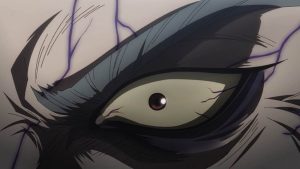 This is undeniably a brilliant gambit. Huan Yi splits his own small force in order to keep the Han army from catching on, and leaves Zhang Tang to command the center and plow directly towards Cheng Hui’s camp. Cheng realizes that the real danger should come from the Bandit’s forces, circling around to his rear, but he underestimates the sheer will of Zhang Tang, who manages to survive long enough to still be around when Cheng and the main Han camp flee Huan Yi, right towards him. A mistake, to be sure.
This is undeniably a brilliant gambit. Huan Yi splits his own small force in order to keep the Han army from catching on, and leaves Zhang Tang to command the center and plow directly towards Cheng Hui’s camp. Cheng realizes that the real danger should come from the Bandit’s forces, circling around to his rear, but he underestimates the sheer will of Zhang Tang, who manages to survive long enough to still be around when Cheng and the main Han camp flee Huan Yi, right towards him. A mistake, to be sure.
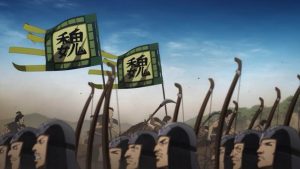 Like I said death is death, and in logical terms I think the distinction Zhang Tang makes is pretty arbitrary. But I confess I got a bit emotional as he passionately pleaded to die as a soldier, not from poison. His rage against what Cheng did to him was genuine and profound, and who am I to judge the motivations of a man who commanded battlefields for 50 years? Likewise I’m not sure Cheng Hui was wrong when he declared that his methods were no less legitimate a battle tactic than killing someone with a glaive, but damn – it sure was satisfying when the old man did just that to Cheng Hui.
Like I said death is death, and in logical terms I think the distinction Zhang Tang makes is pretty arbitrary. But I confess I got a bit emotional as he passionately pleaded to die as a soldier, not from poison. His rage against what Cheng did to him was genuine and profound, and who am I to judge the motivations of a man who commanded battlefields for 50 years? Likewise I’m not sure Cheng Hui was wrong when he declared that his methods were no less legitimate a battle tactic than killing someone with a glaive, but damn – it sure was satisfying when the old man did just that to Cheng Hui.
 This is a victory to be sure, as witness Li Mu’s consternation on hearing the news. But it comes at a great cost, as Huan Yi’s watchtower has fallen in his absence, and the entire defense of the pass is now in the hands of a general who by his own admission is mostly famous for having gone so long without dying. This is the conundrum Qin finds itself in – it can only strike a blow by creating a crisis somewhere else. They have great generals and the sheer motivation of defending their land against an invader going for them, but to the untrained eye not a whole lot else.
This is a victory to be sure, as witness Li Mu’s consternation on hearing the news. But it comes at a great cost, as Huan Yi’s watchtower has fallen in his absence, and the entire defense of the pass is now in the hands of a general who by his own admission is mostly famous for having gone so long without dying. This is the conundrum Qin finds itself in – it can only strike a blow by creating a crisis somewhere else. They have great generals and the sheer motivation of defending their land against an invader going for them, but to the untrained eye not a whole lot else.


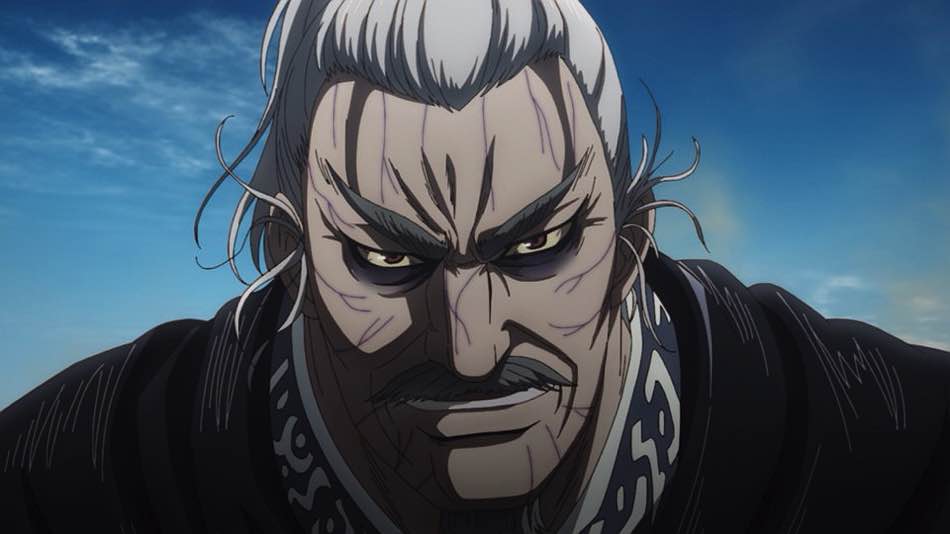
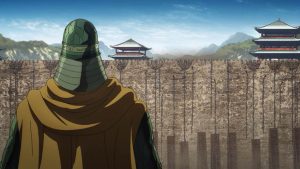
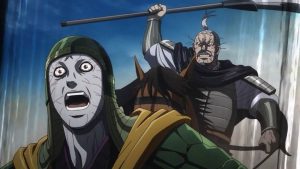
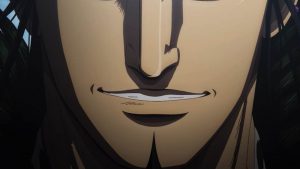
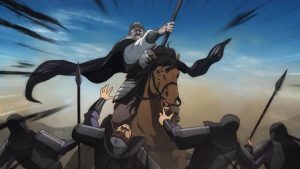
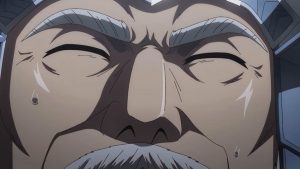
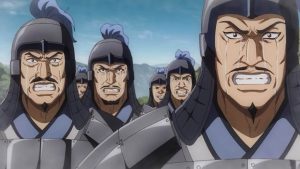
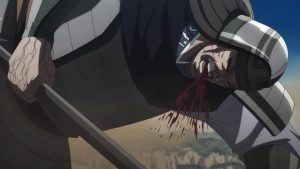
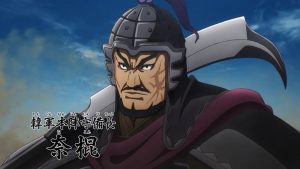
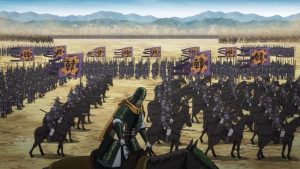


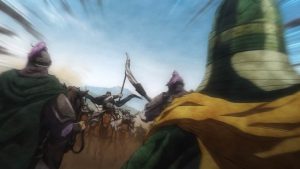
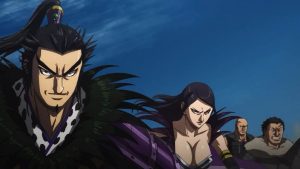
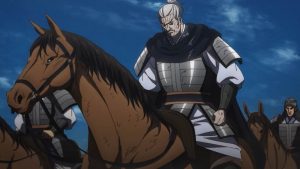
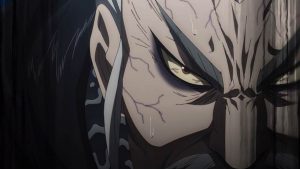
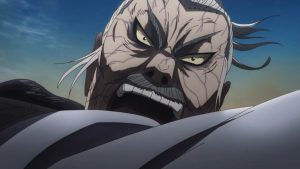

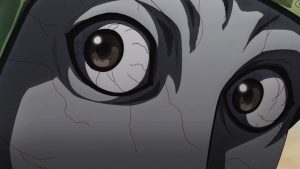
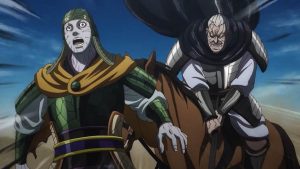
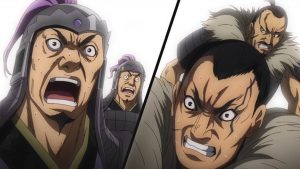
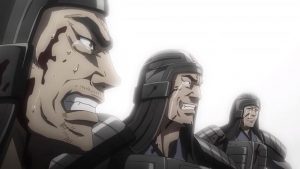
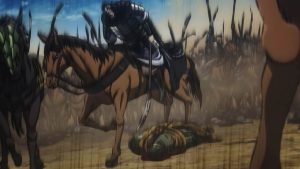

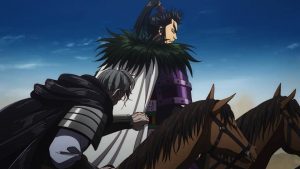
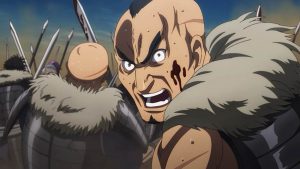
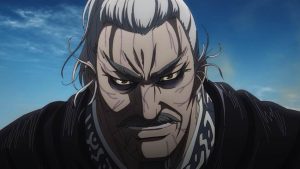
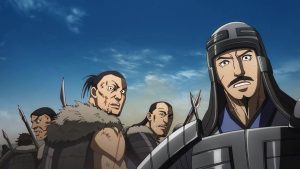
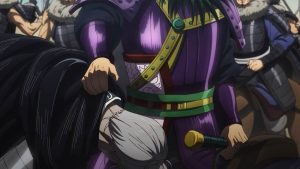
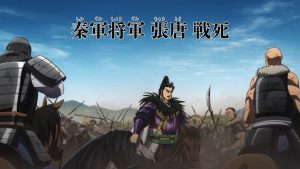
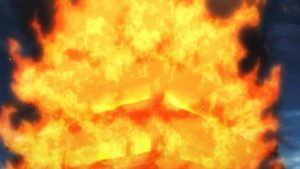

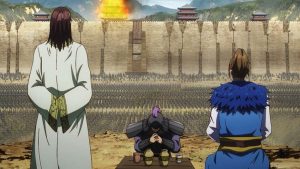


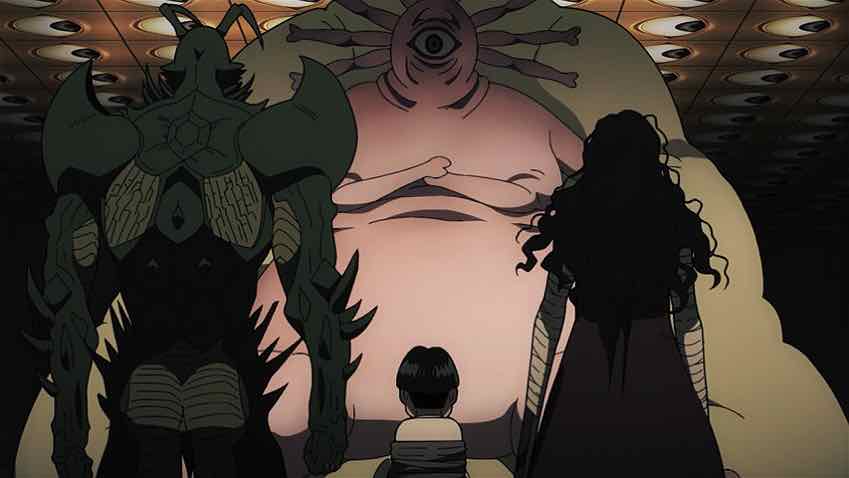
ibtachi
June 19, 2021 at 5:11 pmYeah, the moralism is a bit shaky the minute you stop to think about it (I’m reminded of Chief Kamogawa’s words in Hajime no Ippo “A real professional does whatever is necessary to win”).
But this is Kingdom and I’d be lying if I didn’t get swept up in Zhang Tang’s last hurrah — as always, it’s just that good at what it does.